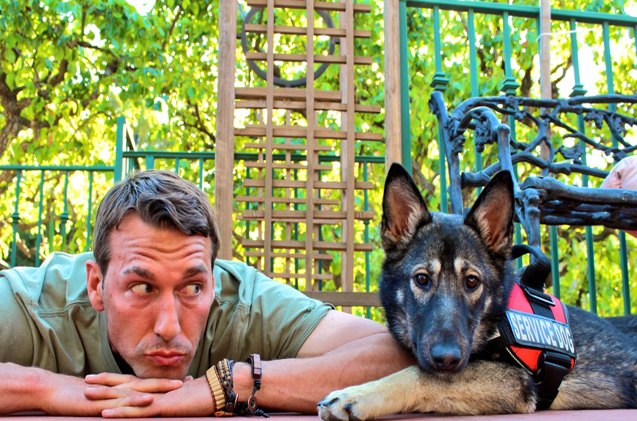Magnolia Paws For Compassion Raises Awareness For Seizure Detection Do

Most people are aware that service dogs can help people who are blind, but not everyone knows the true potential of the dog’s ability to help people with disabilities. Dogs can help people with Post Traumatic Stress Disorder, anxiety disorders, agoraphobia and can even detect seizures in people with epilepsy. That’s where Magnolia Paws for Compassion comes in – to help raise awareness and fund training for service dogs to detect seizures and save lives.
Magnolia Paws for Compassion
Magnolia Paws for Compassion is made up of three organizations whose goal is to teach the world about seizure disorders and the benefits a service dog can provide. These three organizations – Eisai Inc, Epilepsy Foundation and 4 Paws for Ability – all work together for this amazing cause. 4 Paws for Ability is the organization that trains service dogs that will alert their owner as to when a seizure is going to take place. The dogs are trained to bark and alert the caregivers of the person having the seizure. These one-of-a-kind canines are recognized through the Americans with Disabilities Act as legal service dogs.
Related: Does Your Dog’s Nose Hold The Key To Early Cancer Detection?
About Eisai Inc.
Eisai Inc. is a pharmaceutical business that specializes in oncology and specialty care for diseases such as Alzheimer’s disease, epilepsy and metabolic disorders. They are a subsidiary of a Toyko based company, Eisai Co. They have teamed up with the other organizations in an effort to show the world what these service dogs can do to help people with seizure disorders maintain a normal life. Eisai Inc. created Magnolia Paws for Compassion to help patients and their families. Their employees help the cause by fundraising, and by having their own dogs trained as therapy dogs to help show the benefits.
About the Epilepsy Foundation
Since 1968, the Epilepsy Foundation has been working to find a cure for epilepsy and help families live and deal with the disease. The foundation is a non-profit and has 48 affiliated organizations in the United States. Their research team works heavily on new medications and therapies to help people with epilepsy, awareness of the disease, managing the disease and more.
Related: Amazing Therapy Dogs Help Diabetics Live Healthier, Happier Lives
About 4 Paws for Ability
4 Paws for Ability is a non-profit organization that works to place service dogs with those in need. Their main focus is to help children with disabilities, and they also work with veterans. They also help with dog adoptions and raising awareness to the public. 4 Paws was founded by Karen Shirk, whose own life was saved by her service dog.
Putting it All Together: Magnolia Paws for Compassion
Eisai Inc., the Epilepsy Foundation, and 4 Paws for Ability make an astounding team to raise awareness and funding. They have dedicated their cause to showing the world what dogs are capable of. They show the obvious benefits of how a seizure alert dog can save a life, how therapy dogs can improve a life and how even a person’s own dog can help with daily interactions and fighting depression. And now, the program has teamed up with celebrity animal trainer and behaviorist, Brandon McMillan (Host of the CBS show “Lucky Dog”) to spread the word even further.
Brandon McMillan’s Contribution to the Cause
Brandon McMillan has joined forces with Magnolia Paws to raise awareness of the help seizure assist dogs can provide for people with seizure disorders. Sure, he’s handled animals for film and television for almost 11 years, but how many people know that he’s also trained countless service dogs?
I had the chance to speak with Brandon, and he explained just how incredible these animals are. Every service dog is trained specifically for an individual’s needs. They can help with certain tasks, and help lower blood pressure. Seizure assist dogs also help keep their person calm, and are oftentimes trained to lie next to them.
Brandon talks enthusiastically about how these service dogs help bridge social gaps for the handlers, and drastically improve their lives in a social sense. “A dog is an invitation to start a conversation,” he says. “People will gravitate to the dog.” These social interactions help children to come out of their shell and engage with people while they are out with their dog.
Because 4 Paws for Ability works with children, the process is a bit more complex. He mentioned that any breed can be trained, but that certain dogs do it better. It’s pretty common to see Labradors, Golden Retrievers and German Shepherds, but McMillan said that Papillons are great at it, too!
The training process involves the dog, the handler and the caregiver. Since young children can’t be expected to take care of the dog’s daily needs, the caregiver is trained to assist as well. The training process is tailored to the child’s needs, and McMillan had many success stories for me. He told me one story in particular about a young girl in California whose life was completely changed by her service dog. According to McMillan, the family was skeptical at first, but once they committed, the girl was able to live without having to constantly wear a helmet to protect her from falling during a seizure thanks to her service dog.
Brandon’s mission is to continue training these dogs and to keep raising awareness. If you need more proof on how these dogs change lives, be sure to check out the testimonials on the Magnolia Paws for Compassion website. Oh, and be sure to have a box of tissues handy!
One Family’s Story
Besides getting to chat with McMillan, I also had the honor of speaking directly with a family who had a seizure assist dog. This is the story Tom Penders told me of his daughter Becky, and her English Cream golden retriever, Thule.
Becky has epilepsy and autism, and in 2012 she had a terrifying grand mal seizure where she ended up face down on her bed and could have died. After that, the family was in a constant state of worry and they weren’t able to sleep at night because that was when the seizures tended to happen.
The Penders family saw a news story about the Epilepsy Foundation of Florida, and that’s when they inquired about acquiring a service dog for their daughter. They went through the intense training program, where they learned to work with Thule. Part of this process was sending in Becky’s shirt to 4 Paws for Ability after she had a seizure. This was partially how Thule learned to sense Becky’s seizures.
Now, Becky is 16, and her quality of life has improved drastically. Thule alerts her seizures, and also helps with her social life when she’s out with her dog. The dog helps to keep her calm, and will sit next to her when she gets anxious. Her family can sleep at night, knowing their daughter is safe.
“It’s a life changer and a commitment,” says Tom. “For us it’s a great tool. You now know when a seizure is happening, and you can’t beat that!”
The Penders’ family is one of many whose lives have changed thanks to Magnolia Paws for Compassion and their team of amazing people and dogs.
What You Can Do
We’re huge fans of Magnolia Paws for Compassion – if you want to help this wonderful program’s cause by sponsoring a litter of puppies (OMD – what a great gift or awesome office fundraiser idea!), or to benefit from their services, be sure to visit their official website.
Rachel Leavy lives in Rochester, New York with her dog, Maria, and her gecko, Nigel. She has loved animals all her life, and has owned her own dog training and walking company for five years. When she’s not playing with puppies, she can usually be found writing short stories, riding horses or out at a play.

Rachel Leavy lives in Rochester, New York with her dog, Maria, and her gecko, Nigel. She has loved animals all her life, and has owned her own dog training and walking company for five years. When she's not playing with puppies, she can usually be found writing short stories, riding horses or out at a play.
More by Rachel Leavy



























